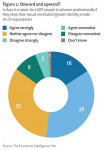The current crisis will stall globalisation says the Economist Intelligence Unit
This report provides an assessment of how the current global financial and economic crisis will affect the global business environment in the medium term, as seen through the prism of the Economist Intelligence Unit's Business Environment Rankings (BER) model. Until recently, it was expected that business environments around the world would continue to improve, reflecting the apparently relentless "forward march of globalisation". Now, however, for the first time since the BER were introduced in 1996, the average business environment score for the 82 countries covered by the model is lower for the five-year forecast period (now 2009-13) than for the historical period (2004-08). Indeed, more than half the countries (44 in all) are expected to have a worse overall business environment in 2009-13 than they had in the past five years.
The current crisis will have a significant impact on business environments. The global business landscape will be characterised by lower cross-border capital flows, tighter regulation and less risk-taking. As measured by the BER, the deterioration in the global business environment reflects worsening market opportunities, increased macroeconomic and political risk, and problems in financial systems.
The severe weakening of the global economy has led to a rise in protectionist sentiment and some protectionist policies are already being pushed through. Although a number of factors are expected to mute protectionist pressures, there is a significant risk that globalisation could suffer severe setbacks. Even before the current crisis, globalisation was under threat from a variety of sources, but the danger to globalisation has now increased many times over. "The potential damage to the global business environment and to longer-term economic growth prospects cannot be underestimated, should there be a descent into significant and sustained protectionism", says Robin Bew, Editorial Director and Chief Economist at the Economist Intelligence Unit.
The BER results do not embody the expectation of a generalised global retreat from openness and the market economy, but some countries will move in the direction of greater statism. By contrast, in many emerging markets, including many that start from a low level and have only relatively recently embarked on liberalisation, reforms are likely to continue, albeit often at a slower pace than would previously have been expected. However, as Laza Kekic, Director for Country Forecasting Services at the Economist Intelligence Unit, points out, "This is a time of great intellectual confusion and uncertainty. The current crisis is raising scepticism about free markets in general. This will have an impact on the regulatory environment in many countries, well beyond the financial sector."
Key findings of the report include:
· The economic downturn is the main reason for the deterioration in the global business environment. Annual average global growth in 2009-13, measured at purchasing power parity (PPP) exchange rates, is forecast to be only half the rate achieved in the previous five years—2.3% compared with 4.6% respectively. Much of the slowdown is a result of the deep and synchronised global recession in 2009, the worst since the end of the second world war, and the very tepid recovery expected next year. But performance in 2011-13 is also forecast to be well below trend.
· The macroeconomic environment will be affected by increased budget deficits and public debt levels, currency volatility and ongoing appreciable risks to asset prices. Poor ratings for the soundness of banking systems, financial sector distortions and impeded access to finance, in particular, will have a significant effect on the outlook for financing.
· There is an increasing risk of political unrest caused by the severe economic downturn, which has led to rising unemployment and economic hardship. Deteriorating relations between governments and opposition forces and increased international tensions—both of which are in part related to economic distress— also mar the outlook for political stability.
· The US and UK suffer a big deterioration. The US's global ranking declines to 12th in the forecast period (2009-13) from 7th in the historical period (2004-08), owing to a severe deterioration in the categories of market opportunities, the macroeconomic environment and financing. For similar reasons, the UK's relative position deteriorates even more sharply—its ranking slides from 13th place to 25th globally.
· Almost all west European countries experience a decline in their business environment scores, but the region nevertheless remains well represented among the top-rated countries.
· China records one of the biggest improvements in the BER—a jump in rank of 11 places, from 56th in 2004-08 to 45th in 2009-13. China moves into the top spot for the market opportunities BER category in 2009-13.
· Half of the countries in Latin America are expected to suffer a deterioration in their business environments between 2004-08 and 2009-13. The global recession will, in particular, have an adverse effect on countries that have made little progress in recent years on structural reforms.
· The global crisis has hit eastern Europe very hard. In the emerging world this region is most exposed to the global turmoil. Political stability is also at risk as many countries in the region have characteristics that are associated with vulnerability to political upheaval.
· The Middle East and North Africa (MENA) is the only region to show clear progress in the forecast period. Most countries in MENA will avoid a recession, which will help to narrow the gap with other regions, as other areas of the world feel the adverse effects of the global economic crisis more deeply. Meanwhile, the business environment is expected to deteriorate in the two largest economies in Sub-Saharan Africa, Nigeria and South Africa.
Globalisation stalled is available free of charge at www.eiu.com/business
About the rankings
The Economist Intelligence Unit's business environment rankings model seeks to measure the attractiveness of a country's business environment and its key components. The assessment of the business environment—based on the opportunities for, and hindrances to, the conduct of business—enables each of the 82 countries covered to be ranked on its overall position and in each of ten categories on a global and a regional basis. The model uses quantitative data, business surveys and expert assessments to measure the attractiveness of countries' business environments. The framework has been designed to reflect the main criteria used by companies to formulate their global business strategies and investment location decisions. The overall scores (on a 1-10 scale) and rankings are based on scores for 91 indicators, grouped into ten categories of the business environment.
About the Economist Intelligence Unit
The Economist Intelligence Unit is the world leader in global business intelligence. It is the business–to–business arm of The Economist Group, which publishes The Economist newspaper. As the world's leading provider of country intelligence, the Economist Intelligence Unit helps executives make better business decisions by providing timely, reliable and impartial analysis on worldwide market trends and business strategies. More information about the Economist Intelligence Unit can be found at www.eiu.com.
웹사이트: http://www.eiu.com
연락처
Joanne McKenna
+44 (0)20 7576 8188
이메일 보내기
이 보도자료는 Economist Intelligence Unit가(이) 작성해 뉴스와이어 서비스를 통해 배포한 뉴스입니다. 뉴스와이어는 편집 가이드라인을 준수합니다.




